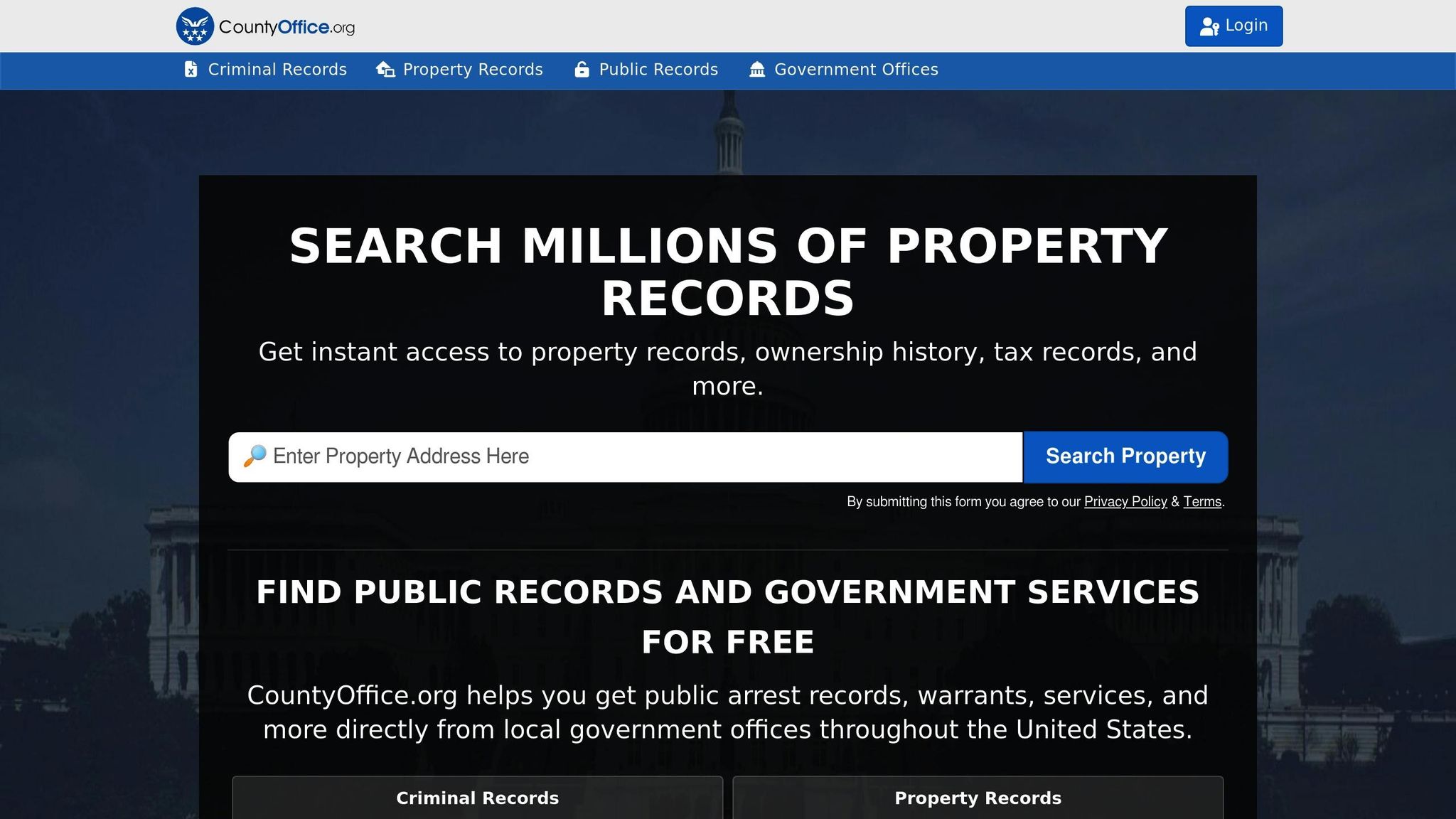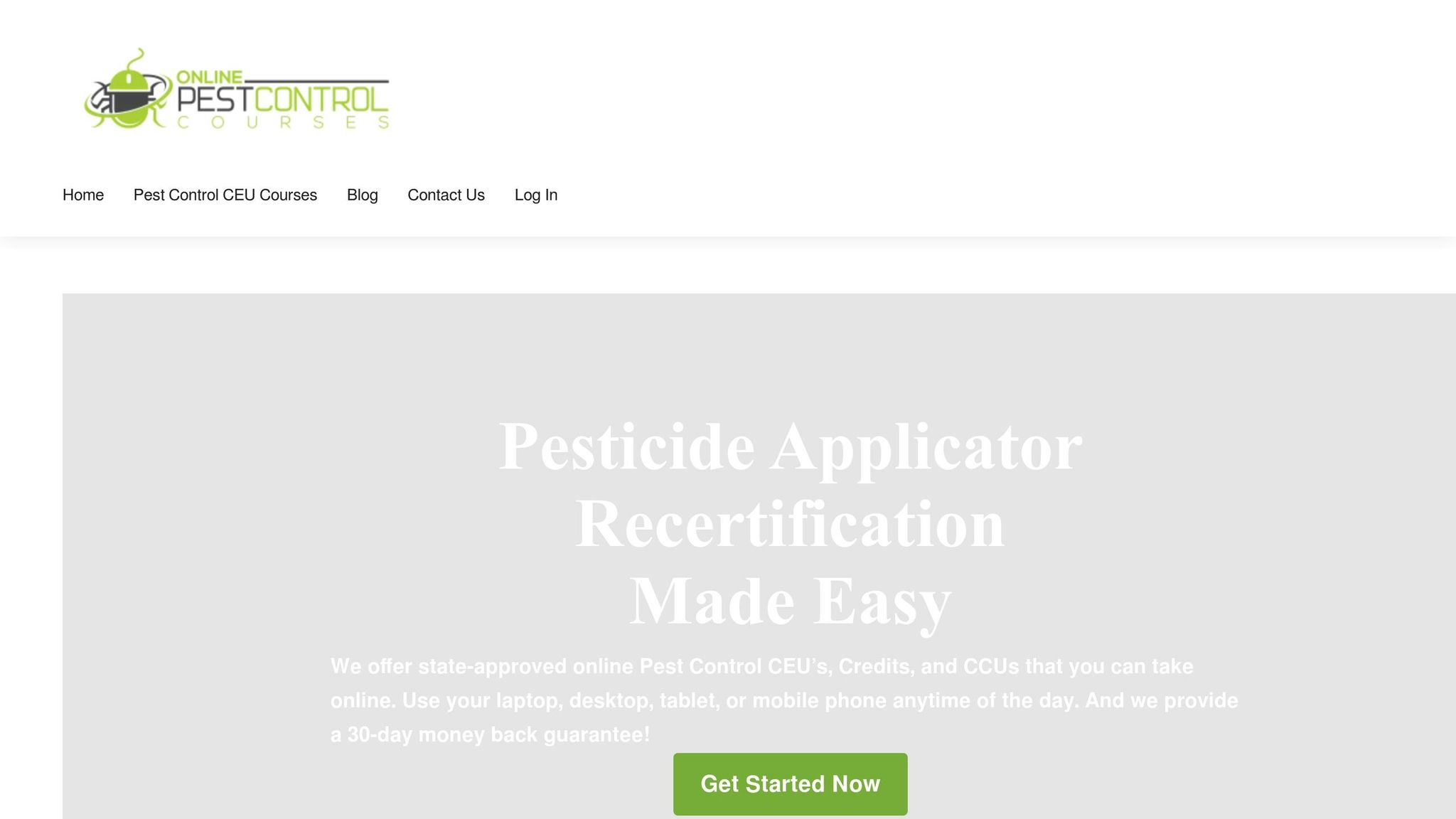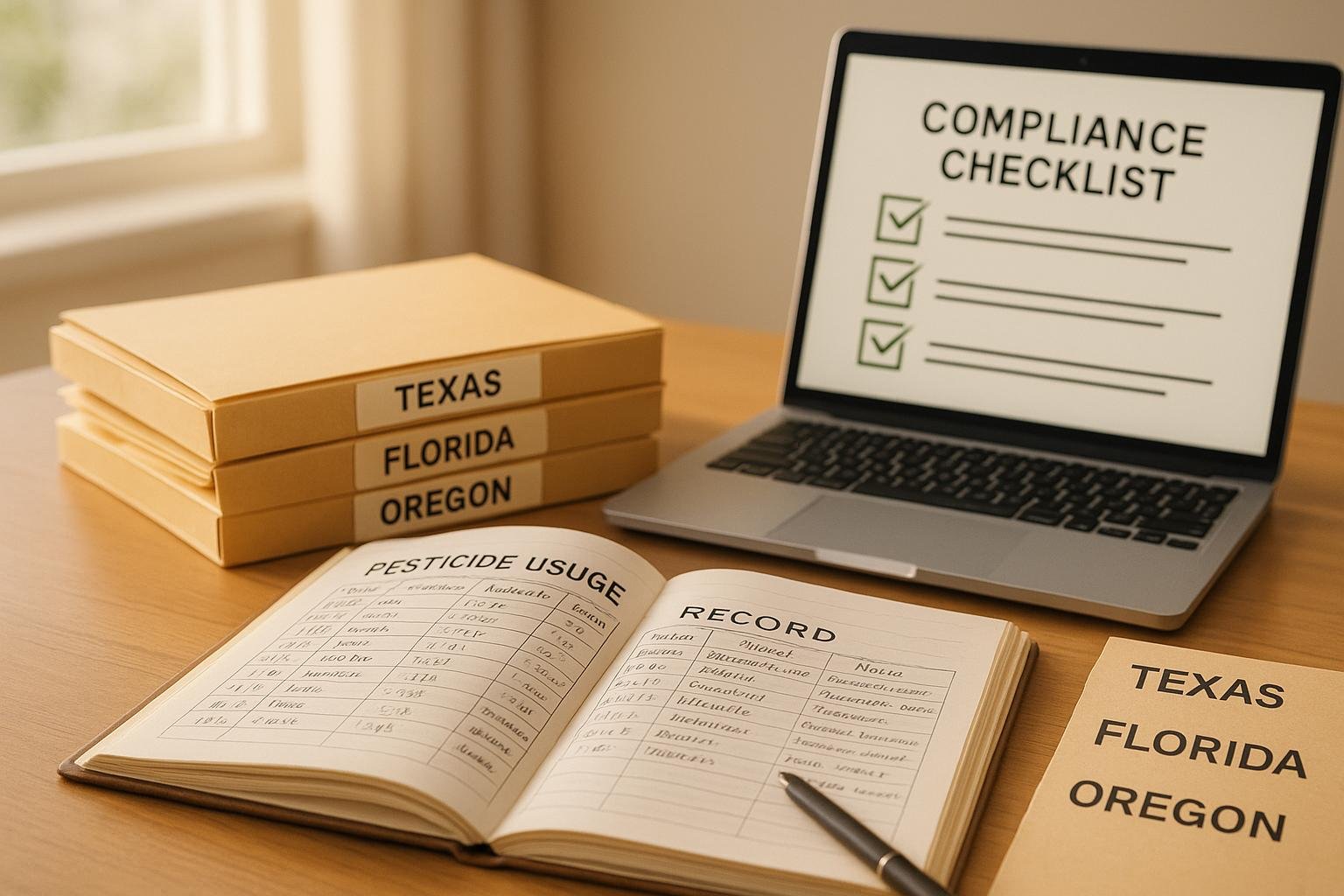Pesticide recordkeeping is essential for applicators to comply with laws, improve operations, and avoid hefty fines. Federal rules mandate keeping restricted-use pesticide (RUP) records for at least two years, but many states require longer retention periods or additional details. Starting July 11, 2025, federal requirements for private applicators will be rescinded, leaving state rules as the primary standard.
Key points to know:
- Federal rules: Private applicators must document RUP applications within 14 days and retain records for two years.
- State rules: Vary widely, often exceeding federal standards. Some states require longer retention periods and additional details like weather conditions.
- Commercial applicators: Face stricter requirements, including providing detailed records to customers within 30 days.
- Common mistakes: Missing applicator details, incomplete forms, and inadequate training records can lead to violations.
To stay compliant:
- Check your state’s specific rules.
- Use detailed, organized records to track applications, inventory, and compliance.
- Regularly review and update records to avoid errors.
Accurate records protect your business from fines, liability claims, and reputational damage. Compliance is not just about avoiding penalties – it’s a smart practice for long-term success.
What Kind Of Documentation Is Required For Pesticide Application? – CountyOffice.org

Federal Pesticide Record Requirements
Federal pesticide recordkeeping rules establish the baseline standards for all states. Under the Federal Pesticide Recordkeeping Program, authorized by the Food, Agriculture, Conservation, and Trade Act of 1990, a unified system ensures consistent tracking of restricted use pesticide (RUP) applications across the country.
Main Federal Guidelines
Certified private applicators must retain RUP application records for at least two years, meeting the federal minimum standard. This requirement applies exclusively to RUPs, which are tightly regulated due to their potential risks to human health and the environment.
Applicators are required to document RUP applications within 14 days of treatment, capturing nine key pieces of information. The Agricultural Marketing Service (AMS) oversees the program and specifies the following required data:
| Required Record Elements for RUP Application | Description |
|---|---|
| Brand or Product Name | The trademark name of the pesticide used |
| EPA Registration Number | Found on the pesticide label |
| Total Quantity Applied | Measured in standard units (e.g., pints, quarts, gallons) |
| Application Date | Month, day, and year of application |
| Location of Application | Identified by county, range, township, section, or another system |
| Crop, Commodity, Site | The specific area or item treated |
| Size of Area Treated | Measured in acres, linear feet, bushels, cubic feet, number of animals, etc. |
| Applicator Name | Name of the certified private applicator |
| Certification Number | The applicator’s certification number |
One practical feature of the federal rules is their flexibility – there’s no mandatory format for recordkeeping. Applicators can incorporate RUP records into their existing systems, avoiding unnecessary duplication while staying compliant.
For commercial applicators, there’s an additional requirement: they must provide customers with the same detailed application records within 30 days. This ensures property owners and managers have timely and accurate information about pesticide applications on their property.
Federal regulations also govern who can access these records. Qualified health care professionals, USDA representatives, or state pesticide regulators may review RUP records to support public health investigations or enforce compliance.
To ease administrative burdens, the rules include exceptions for certain small-scale applications.
Federal Rule Exceptions
Special exceptions simplify recordkeeping for limited pesticide applications. For example, if restricted use pesticides are applied on the same day in an area smaller than 1/10 of an acre, applicators can follow reduced documentation requirements. In such cases, they only need to record the date, product name, EPA registration number, amount applied, and mark the location as "Spot application" with a brief description. However, this exception doesn’t apply to greenhouse or nursery treatments, which always require full documentation.
Federal facilities must also maintain RUP records unless the application is performed by a certified private contractor. In those cases, the contractor’s records fulfill the federal requirement.
If state regulations are deemed equivalent to federal standards, certified private applicators can follow state rules instead of duplicating efforts. However, in states without RUP recordkeeping requirements, applicators must default to federal standards.
State Record Retention Periods
Federal regulations once required private applicators to keep records of Restricted Use Pesticide (RUP) applications for two years. However, many states have since implemented their own rules, often requiring longer retention periods or additional details. These state-level standards go beyond federal guidelines, reflecting a more tailored approach to local needs.
Retention Periods by State
In several states, the required retention period for records surpasses the federal baseline. Some states even mandate the inclusion of extra data, such as environmental conditions at the time of application – details like wind direction, wind speed, and air temperature. These requirements help assess potential impacts more thoroughly.
The federal recordkeeping requirement for private applicators is set to be rescinded on July 11, 2025. Despite this upcoming change, many states continue to enforce their own, stricter rules. Additionally, recordkeeping obligations can vary depending on the type of applicator.
Applicator Types and State Requirements
The type of applicator plays a major role in determining recordkeeping responsibilities. Here’s how the requirements differ:
- Commercial Applicators: These applicators often face the most detailed recordkeeping mandates. They must document RUP applications thoroughly and provide customers with a copy of these records within 30 days. If they supervise non-certified personnel, they are also required to maintain records about the qualifications of those individuals.
- Private Applicators: In many states, private applicators are required to document all pesticide applications, not just RUPs. This broader scope ensures compliance with state-specific regulations that go beyond federal standards.
- Non-commercial Applicators: Those working for government agencies, schools, or non-profits are subject to state-specific rules that may differ from those for private or commercial applicators.
The Worker Protection Standard (WPS) adds another layer of complexity for commercial applicators. In addition to state-mandated records, they often need to maintain separate WPS documentation.
Given the variety of requirements, applicators should consult their state’s Department of Agriculture or Extension Service to confirm the rules that apply to their certification and location. Even when not legally required, keeping detailed records can be a smart way to protect against liability and regulatory issues.
sbb-itb-c4006de
Common Recordkeeping Mistakes to Avoid
Even seasoned applicators can make errors when it comes to recordkeeping. Recognizing these common mistakes is key to safeguarding your business from regulatory troubles and potential legal challenges.
Most Common Recordkeeping Errors
Staying compliant isn’t just about meeting guidelines – it’s also about steering clear of frequent recordkeeping missteps. Inspectors often flag paperwork errors, with data revealing that 21% of violations stem from failing to record the name and license of the individual applying pesticides – the most commonly cited issue during inspections. Another common problem? 18% of applicators run into trouble when service report forms are missing proper jurisdiction statements.
When it comes to termite-related records, errors include missing definitions (16%), absent diagrams (8%), and for WDI inspections, omitting purchaser details (7%) or failing to label diagrams (6%).
Training compliance is another weak spot: 15% of applicators do not ensure their employees have the required Continuing Education Units (CEUs). Additionally, many applicators fail to include critical extra details – like equipment setup, weather delays, or rescheduled applications – which can create gaps during inspections.
Best Practices for Accurate Records
To avoid these pitfalls, focus on documenting everything thoroughly. Include detailed information about the materials used, application methods, equipment configurations, and any unusual circumstances that arise before, during, or after treatment.
Using compliance checklists is a practical way to identify and address vulnerabilities in your recordkeeping system. Make it a habit to review your records regularly – monthly reviews are ideal – to catch and correct issues before they escalate.
Always track rescheduled or canceled applications by noting the date of the change and the reasons behind it, whether it’s due to weather, equipment problems, or customer requests. Regular reviews can help ensure your records remain accurate and up to date.
Organize and securely store your records, whether in physical form or digitally, so they’re easy to retrieve during inspections. Non-compliance can be costly; for instance, in Q4 2024 alone, the EPA finalized 215 settlement agreements, resulting in $7,739,116 in fines for FIFRA violations.
Lastly, stay informed about regulatory updates by subscribing to the EPA’s Bulletin Live Two! service. This system provides timely updates on pesticide-use restrictions in your service areas, helping you stay ahead of changes and strengthen your recordkeeping practices.
How Online Pest Control Courses Help with Compliance

Online Pest Control Courses make staying compliant easier by offering state-approved training and practical tools for managing records. These courses provide a solid foundation for understanding the certification requirements specific to your state.
State-Approved Training for Applicators
The platform offers state-approved Continuing Education Units (CEUs) and Continuing Certification Units (CCUs), keeping applicators up to date with recordkeeping practices and regulatory updates. This is critical because training programs must address both state and federal pesticide laws and regulations. By doing so, they ensure you’re aware of retention periods and documentation rules specific to your state.
Applicators can choose to recertify by retaking the certification exam or earning credits, providing flexibility that fits into busy schedules. For example, the Missouri Department of Agriculture‘s Bureau of Pesticide Control approves recertification training courses, showcasing how state agencies validate quality online training.
These courses go beyond just compliance – they cover pesticide laws, formulations, environmental considerations, and pest management strategies. This helps you see how recordkeeping fits into the larger regulatory picture.
Platform Features for Easier Compliance
In addition to state-approved training, Online Pest Control Courses offer practical features designed for professionals who need to balance compliance with their demanding work schedules. The mobile-friendly platform lets you access training materials and review recordkeeping requirements directly from the field, making it simple to refresh your knowledge on the go.
After completing a course, you can immediately download your certificate to update your compliance records. The platform is accessible on multiple devices, so you can study whenever and wherever it’s convenient. By selecting state-approved courses, you can ensure that your credits count toward recertification. It’s important to choose courses that match your state’s specific requirements for license renewal, avoiding wasted time on training that doesn’t meet local standards.
The platform also offers a 30-day money-back guarantee and secure checkout, giving you confidence in your investment. With courses tailored to multiple states, you can easily find training that aligns with your local recordkeeping needs and compliance responsibilities. These features integrate seamlessly with broader regulatory practices, helping you maintain accurate and consistent records.
Conclusion: Meeting Requirements and Growing Professionally
Understanding federal and state pesticide recordkeeping requirements goes beyond avoiding penalties – it’s about laying the groundwork for a reliable and successful career as a pesticide applicator. Recent enforcement actions have shown the steep financial risks involved, including hefty fines and potential license suspensions. These examples highlight how solid recordkeeping practices not only ensure compliance but also help grow and protect your business.
Keeping thorough records isn’t just a legal necessity – it’s a smart business move. It streamlines operations, minimizes liability risks, and strengthens your professional reputation. As the USDA Agricultural Marketing Service points out:
"Keeping pesticide application records is a good business practice and has numerous benefits!"
Accurate records play a crucial role in operational planning, informed decision-making, and shielding your business from legal challenges.
Take Maria, for instance – a certified pesticide applicator who diligently follows all regulatory guidelines and keeps detailed records. Her attention to documentation has led to healthier trees, reduced pest issues, and full regulatory compliance. On the flip side, applicators who neglect these responsibilities face fines, possible license suspensions, harm to their reputation, and even environmental damage.
Expert opinions further reinforce this point. Kathy Glassey, Senior Consultant with Inspire Green Inc., explains:
"Staying compliant with regulatory standards is, therefore, an essential aspect of risk management. It’s far less expensive – and much more responsible – to ensure that your practices align with regulations from the outset than to deal with the fallout of noncompliance."
Success in this field depends on a commitment to ongoing education and proactive compliance. Regularly reviewing updates from the EPA and state agencies keeps you informed about new regulations, while continuous training helps you adopt the most efficient and compliant methods available.
FAQs
How do state pesticide recordkeeping rules differ from federal guidelines, and where can I find my state’s requirements?
Federal law mandates that records of federally restricted-use pesticide (RUP) applications must be kept for a minimum of 2 years. However, many states have their own rules, which might require holding onto records for a longer period or providing extra documentation. These state-specific regulations are overseen by local pesticide regulatory agencies.
To ensure you’re meeting your state’s requirements, reach out to your state’s pesticide regulatory office or visit their official website. Staying up to date not only helps you remain compliant but also ensures your records are ready for audits or inspections.
What happens if pesticide records aren’t kept properly, and how can applicators avoid common mistakes?
Failing to maintain accurate pesticide records can bring about serious problems, such as regulatory penalties, hefty fines, or even legal disputes. Beyond that, poor recordkeeping could make it challenging to prove compliance or defend against accusations of misuse.
To steer clear of common pitfalls, applicators should focus on keeping records that are thorough, precise, and securely stored for at least two years – or longer if state laws demand it. Key information to log includes the pesticide name, application date, location, target pest, and the rate of application. Staying organized and adopting effective record management practices can help reduce liability risks and ensure compliance with all regulations.
Good documentation does more than just protect your business – it also highlights your commitment to responsible pesticide use and care for the environment.
How can online pest control courses help with pesticide recordkeeping requirements?
Online pest control courses equip pesticide applicators with the skills and knowledge to meet both federal and state recordkeeping requirements. These courses delve into crucial areas like accurately documenting pesticide applications, understanding how long records need to be kept (such as the two-year minimum for private applicators), and adhering to specific rules for commercial applicators.
By covering Environmental Protection Agency (EPA) regulations alongside state-specific laws, these courses help applicators ensure their records are up to legal standards, avoid potential fines, and stay well-organized. Plus, they offer a convenient way to stay updated on compliance requirements without disrupting daily work routines.






